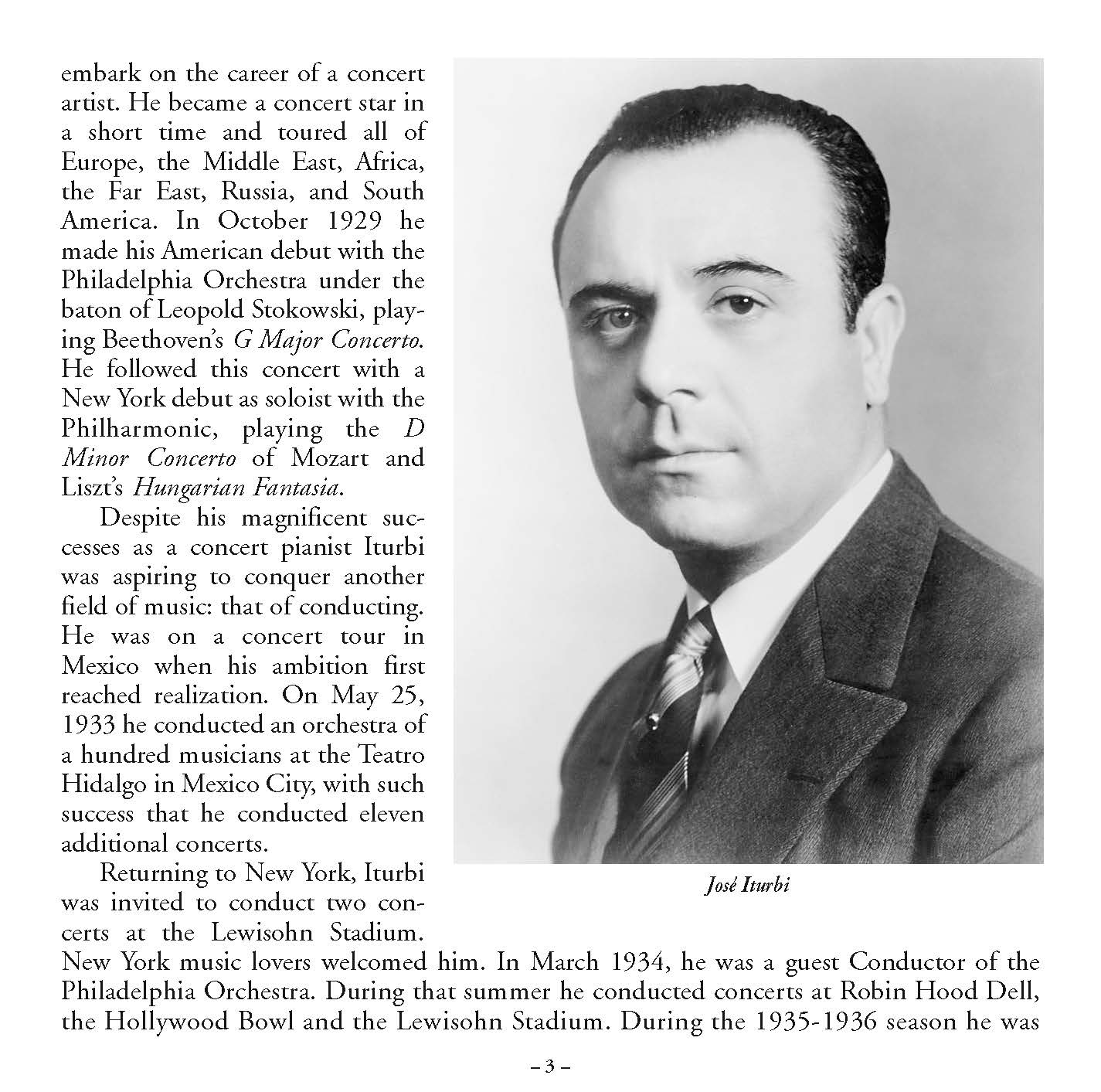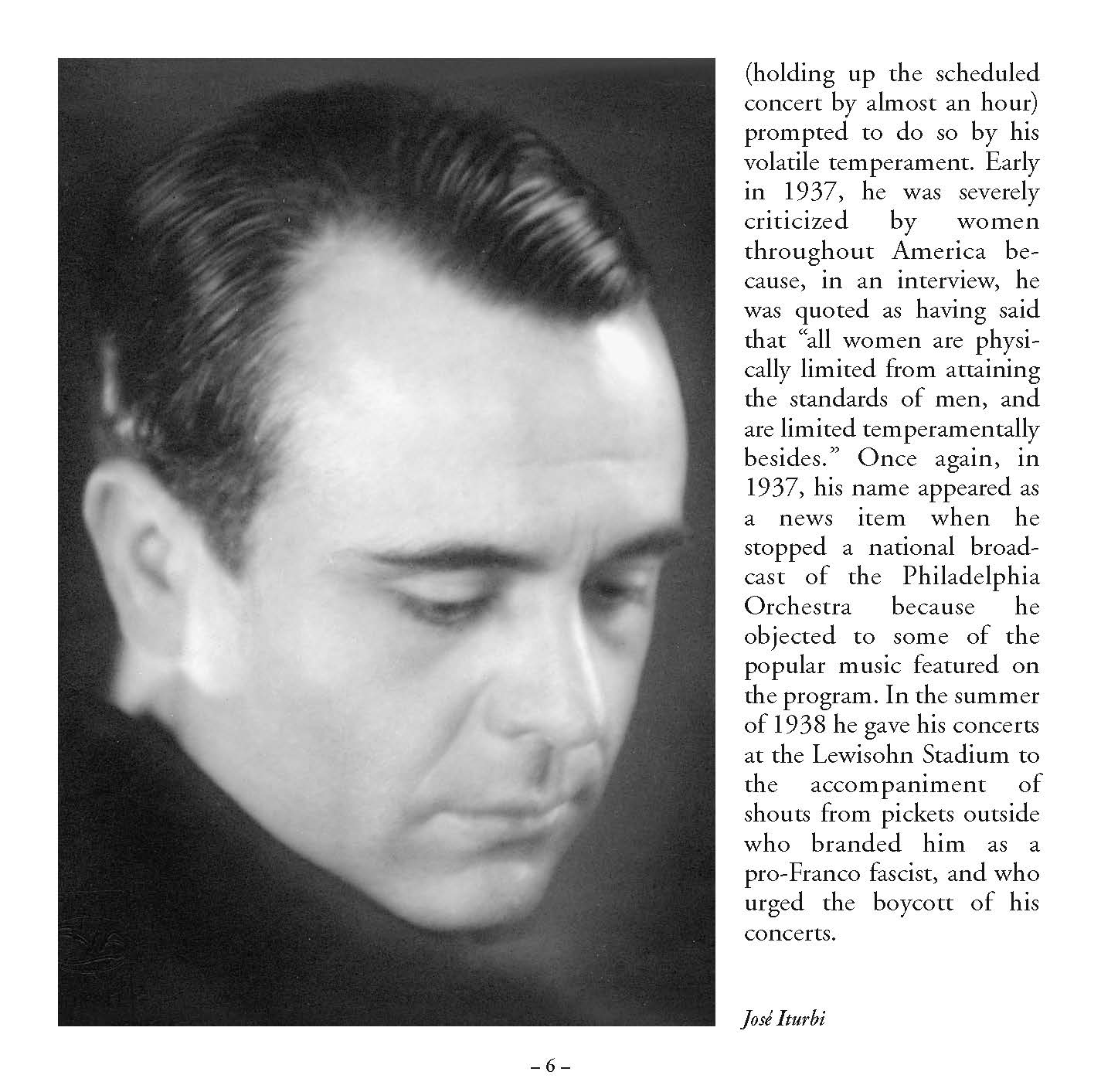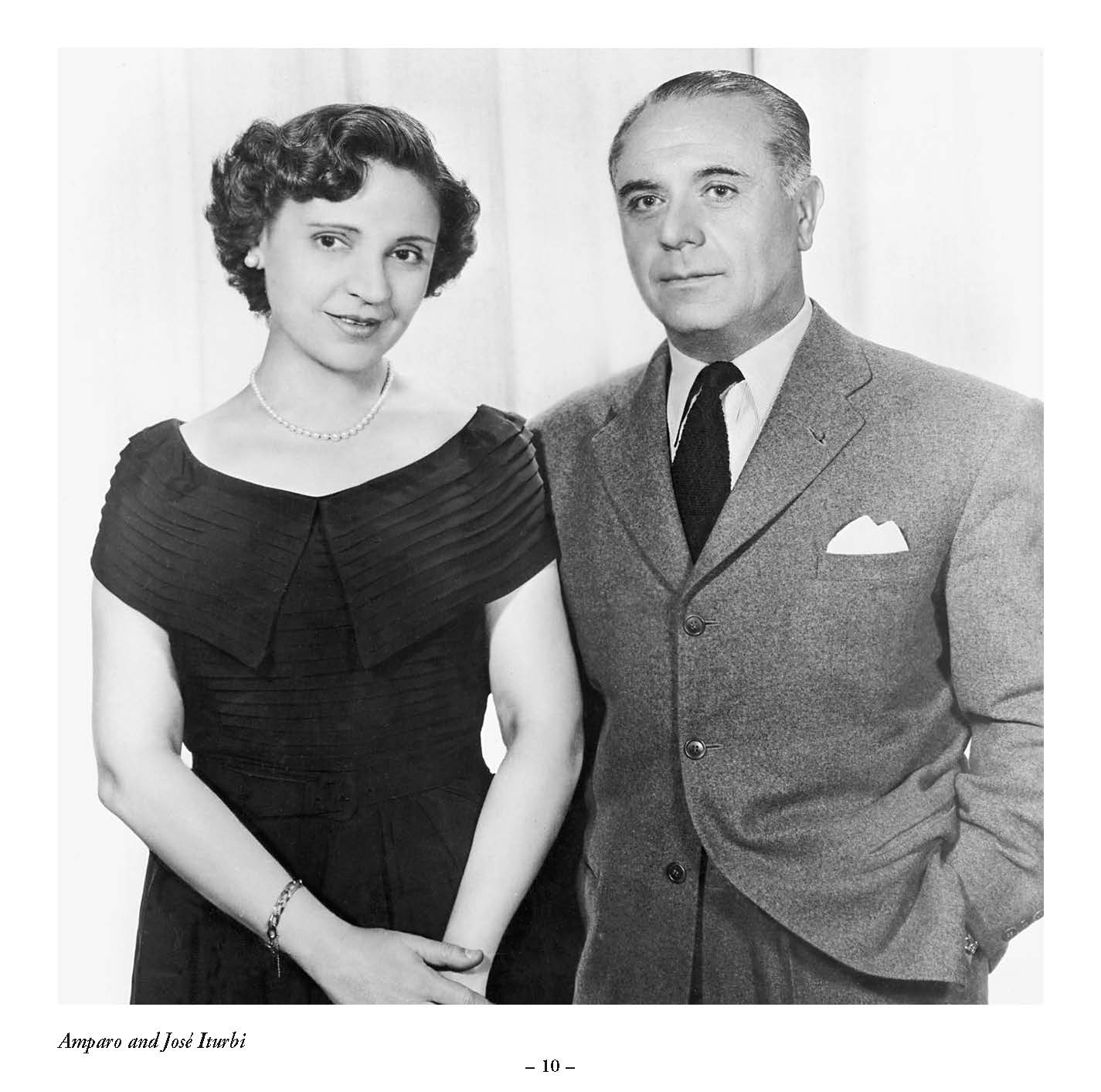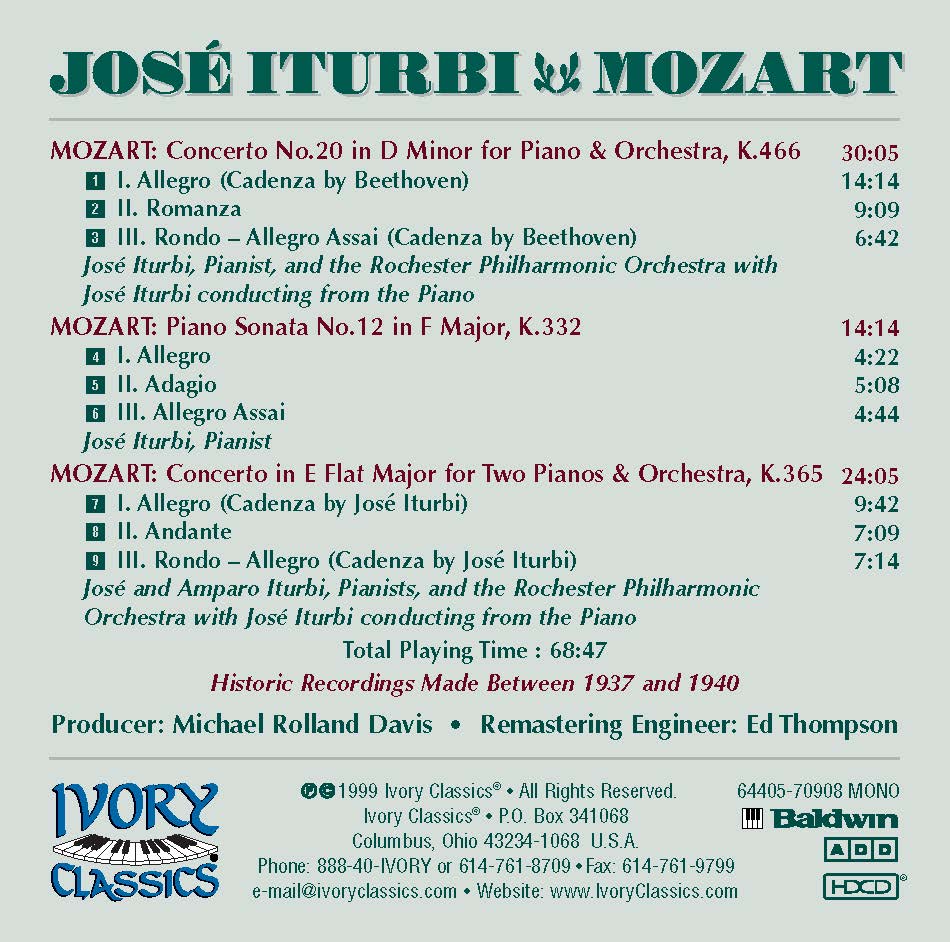1
/
of
16
Ivory Classics Music
José Iturbi: Mozart Piano Concertos and Piano Sonata
José Iturbi: Mozart Piano Concertos and Piano Sonata
Regular price
$10.00 USD
Regular price
Sale price
$10.00 USD
Unit price
/
per
Couldn't load pickup availability
Ivory Classics CD-70908
José Iturbi: Mozart
Wolfgang Amadeus Mozart (1756-1791):
Piano Concerto No. 20 in D Minor, K. 466
01. 1st Mvt.: Allegro (Cadenza by Beethoven)14:14 ('40)
02. 2nd Mvt.: Romanza09:09 ('40)
03. 3rd Mvt.: Rondo - Allegro assai (Cadenza by Beethoven)06:42 ('40)
Piano & Conductor: José Iturbi
orchestra: Rochester Philharmonic Orchestra
Sonata No. 12 in F Major, K. 332
04. 1st Mvt.: Allegro04:22 ('37)
05. 2nd Mvt.: Adagio05:08 ('38)
06. 3rd Mvt.: Allegro assai04:44 ('37)
piano: José Iturbi
Concerto in E Flat Major for Two Pianos and Orchestra, K. 365
07. 1st Mvt.: Allegro (Cadenza by José Iturbi)09:42 ('40)
08. 2nd Mvt.: Andante07:09 ('40)
09. 3rd Mvt.: Rondo: Allegro (Cadenza by José Iturbi)07:14 ('40)
Piano & Conductor: José Iturbi
Piano: Amparo Iturbi
orchestra: Rochester Philharmonic Orchestra
Producer: Michael Rolland Davis
Engineer: Ed Thompson
Piano: Baldwin
(ADD)
Historic recordings made between 1937 and 1940.
Remastered using 24-Bit State-of-the-Art Technology - HDCD Encoded
World-famous Spanish-born concert pianist Jose Iturbi (1895-1980) was renowned for his brilliant interpretations of Mozart. Restored and remastered from the original recordings made between 1937 and 1940, the disc features three of Mozart's masterpieces, all conducted from the keyboard by Mr. Iturbi. His sister, Amparo Iturbi joins him in the extraordinarily beautiful Two Piano Concerto. The clearness and fluency of interpretation and the crispness of execution, make these legendary performances a must for all serious collectors of great piano playing and, of course, elegant Mozart playing.
Disc.Reviews
It's certainly unfair that Jose Iturbi's name has become so little known. Partly this must stem from his exceptional popularity - he had a couple of million-selling RCA discs - but also from the direction his career took when he assumed the conductorship of the Rochester Philharmonic. His film stardom was pretty much a nail in the coffin of his connoisseur reputation. In this all-Mozart disc that restores Iturbi's 1937-40 RCA Victors to the catalog, we have a strong insight into his playing of the central repertoire, as distinct, say, from his perhaps more celebrated Albeniz.
Born in Valencia in 1895 Iturbi was, as were many Spanish pianists, trained in Paris. He earned a precarious living in cafes and taught elsewhere in Switzerland before accepting a position at the Conservatory in Geneva. Despite increasing success as a concert soloist - he made his American debut for instance playing the Beethoven G minor accompanied by Stokowski and the Philadelphia - his sights were set on a conductor's career. He guest conducted widely before, in the 1936-37 season, he was appointed Rochester's conductor and his enormous popularity really dates from the period of his numerous MGM films - rather garish and ghastly if memory serves right.
Ivory Classics' disc shows that he had very distinct gifts as a Mozartian - unmannered, direct, plain-speaking, imperturbable, technically eloquent, and fully capable of withstanding any technical or expressive problem. The D minor Concerto - which like the Double Concerto he directs from the keyboard - elicits from Iturbi a measured and effortless musicality. He also has a deal of style and manages to elucidate the orchestral string figuration with care and clarity. The answering violin phrases are very well brought out and when it comes to his pianism his cadenza (Beethoven's) is notably successful. There are maybe some overripe string phrases in the Romanza but we can certainly forgive him this indulgence for the affectionate simplicity he brings to the music. What I did lack though from time to time was a greater sense of depth. For all the elegance and lyrical impress - undeniable - there was some lack of verticality in his response. No arguments about the finale however - fluent and fleet and decisive. The Double Concerto with his sister Amparo is a strong one though hardly one preferable to the Schnabels' almost contemporaneous recording. Its virtues are splendid passagework, sympathetic collaboration, very fine cadenzas from Iturbi himself and a buoyant musicality. The central work is the F major sonata K332. Clearly he was a significant Mozartian and this performance signals his abundant talent. Much admired though the recording is however I find the root of the Iturbi problem as ultimately one of a lack of projection of the inner life of the Adagio. For all his clarity and for all his self-evident finesse there is sometimes a frustrating lack of deeper exploration. Still, these limitations - if such they are - are no bar to appreciation of his other strikingly persuasive strengths and this Ivory Classics transfer presents these recordings with notable success, indeed with a clarity that befits Iturbi's own.
Music Web.com, Mar. 2003
Jose Iturbi is unfairly under-represented in the reissue market. He had a major career and was a popular figure with audiences and record buyers for four decades. Iturbi's playing of Mozart is stylish, unaffected, and authoritative. The great D minor Concerto, directed from the keyboard, is sparkling technically with the phrasing taut and well-shaped. In the Concerto for two pianos, K365, again directed from the piano, his sister Amparo collaborates with him and the pair produce a stylish performance, featuring idiomatic cadenzas by Jose.
International Piano, Aug. 2001
This is an excellently remastered collection of Mozart recordings, originally made between 1937 and 1940, suggesting that Jose Iturbi was a worthier musician than his current non-reputation would suggest. Iturbi's playing often stresses his warmth and tonal refinement.
Fanfare Magazine, Feb. 2000
This disc represents Iturbi at the peak of his career (1937 to 1940) in three works by Mozart. This is Mozart playing of rare distinction: bracing tempos, elegant phrasing, transparent textures, and extraordinary balances between soloist(s) and orchestra. The pianistic articulation is brilliant, and the orchestra really sings. These are carefully rehearsed but yet marvelously spontaneous performances by a pianist-conductor who is really inside the scores. The D minor Concerto is glorious - the second movement is one of the most melting performances I have ever heard.
American Record Guide, Feb. 2000
José Iturbi: Mozart
Wolfgang Amadeus Mozart (1756-1791):
Piano Concerto No. 20 in D Minor, K. 466
01. 1st Mvt.: Allegro (Cadenza by Beethoven)14:14 ('40)
02. 2nd Mvt.: Romanza09:09 ('40)
03. 3rd Mvt.: Rondo - Allegro assai (Cadenza by Beethoven)06:42 ('40)
Piano & Conductor: José Iturbi
orchestra: Rochester Philharmonic Orchestra
Sonata No. 12 in F Major, K. 332
04. 1st Mvt.: Allegro04:22 ('37)
05. 2nd Mvt.: Adagio05:08 ('38)
06. 3rd Mvt.: Allegro assai04:44 ('37)
piano: José Iturbi
Concerto in E Flat Major for Two Pianos and Orchestra, K. 365
07. 1st Mvt.: Allegro (Cadenza by José Iturbi)09:42 ('40)
08. 2nd Mvt.: Andante07:09 ('40)
09. 3rd Mvt.: Rondo: Allegro (Cadenza by José Iturbi)07:14 ('40)
Piano & Conductor: José Iturbi
Piano: Amparo Iturbi
orchestra: Rochester Philharmonic Orchestra
Producer: Michael Rolland Davis
Engineer: Ed Thompson
Piano: Baldwin
(ADD)
Historic recordings made between 1937 and 1940.
Remastered using 24-Bit State-of-the-Art Technology - HDCD Encoded
World-famous Spanish-born concert pianist Jose Iturbi (1895-1980) was renowned for his brilliant interpretations of Mozart. Restored and remastered from the original recordings made between 1937 and 1940, the disc features three of Mozart's masterpieces, all conducted from the keyboard by Mr. Iturbi. His sister, Amparo Iturbi joins him in the extraordinarily beautiful Two Piano Concerto. The clearness and fluency of interpretation and the crispness of execution, make these legendary performances a must for all serious collectors of great piano playing and, of course, elegant Mozart playing.
Disc.Reviews
It's certainly unfair that Jose Iturbi's name has become so little known. Partly this must stem from his exceptional popularity - he had a couple of million-selling RCA discs - but also from the direction his career took when he assumed the conductorship of the Rochester Philharmonic. His film stardom was pretty much a nail in the coffin of his connoisseur reputation. In this all-Mozart disc that restores Iturbi's 1937-40 RCA Victors to the catalog, we have a strong insight into his playing of the central repertoire, as distinct, say, from his perhaps more celebrated Albeniz.
Born in Valencia in 1895 Iturbi was, as were many Spanish pianists, trained in Paris. He earned a precarious living in cafes and taught elsewhere in Switzerland before accepting a position at the Conservatory in Geneva. Despite increasing success as a concert soloist - he made his American debut for instance playing the Beethoven G minor accompanied by Stokowski and the Philadelphia - his sights were set on a conductor's career. He guest conducted widely before, in the 1936-37 season, he was appointed Rochester's conductor and his enormous popularity really dates from the period of his numerous MGM films - rather garish and ghastly if memory serves right.
Ivory Classics' disc shows that he had very distinct gifts as a Mozartian - unmannered, direct, plain-speaking, imperturbable, technically eloquent, and fully capable of withstanding any technical or expressive problem. The D minor Concerto - which like the Double Concerto he directs from the keyboard - elicits from Iturbi a measured and effortless musicality. He also has a deal of style and manages to elucidate the orchestral string figuration with care and clarity. The answering violin phrases are very well brought out and when it comes to his pianism his cadenza (Beethoven's) is notably successful. There are maybe some overripe string phrases in the Romanza but we can certainly forgive him this indulgence for the affectionate simplicity he brings to the music. What I did lack though from time to time was a greater sense of depth. For all the elegance and lyrical impress - undeniable - there was some lack of verticality in his response. No arguments about the finale however - fluent and fleet and decisive. The Double Concerto with his sister Amparo is a strong one though hardly one preferable to the Schnabels' almost contemporaneous recording. Its virtues are splendid passagework, sympathetic collaboration, very fine cadenzas from Iturbi himself and a buoyant musicality. The central work is the F major sonata K332. Clearly he was a significant Mozartian and this performance signals his abundant talent. Much admired though the recording is however I find the root of the Iturbi problem as ultimately one of a lack of projection of the inner life of the Adagio. For all his clarity and for all his self-evident finesse there is sometimes a frustrating lack of deeper exploration. Still, these limitations - if such they are - are no bar to appreciation of his other strikingly persuasive strengths and this Ivory Classics transfer presents these recordings with notable success, indeed with a clarity that befits Iturbi's own.
Music Web.com, Mar. 2003
Jose Iturbi is unfairly under-represented in the reissue market. He had a major career and was a popular figure with audiences and record buyers for four decades. Iturbi's playing of Mozart is stylish, unaffected, and authoritative. The great D minor Concerto, directed from the keyboard, is sparkling technically with the phrasing taut and well-shaped. In the Concerto for two pianos, K365, again directed from the piano, his sister Amparo collaborates with him and the pair produce a stylish performance, featuring idiomatic cadenzas by Jose.
International Piano, Aug. 2001
This is an excellently remastered collection of Mozart recordings, originally made between 1937 and 1940, suggesting that Jose Iturbi was a worthier musician than his current non-reputation would suggest. Iturbi's playing often stresses his warmth and tonal refinement.
Fanfare Magazine, Feb. 2000
This disc represents Iturbi at the peak of his career (1937 to 1940) in three works by Mozart. This is Mozart playing of rare distinction: bracing tempos, elegant phrasing, transparent textures, and extraordinary balances between soloist(s) and orchestra. The pianistic articulation is brilliant, and the orchestra really sings. These are carefully rehearsed but yet marvelously spontaneous performances by a pianist-conductor who is really inside the scores. The D minor Concerto is glorious - the second movement is one of the most melting performances I have ever heard.
American Record Guide, Feb. 2000
Share
































